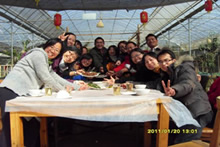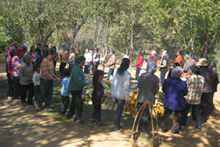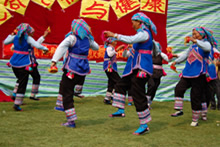By Li Zi-yue
Eco-health --- When PCD came across the concept of eco-health towards the end of 2004, an enthusiastic team was born. Their main purpose was to search for eco-health, which is a human-oriented ecological value system.
It is supported by 3 pillar-themes: cross-science, community participation and gender equality (equality between two sexes). It is aimed at sustainable improvement of human health through environmental protection and improvement.
Investigation of every aspect of daily living
In the 6 years that have since passed, we have been puzzled by how to really ‘do’ cross-science. When eco-health talks about “human-orientation”, then what has it got to do with nature? When we put emphasis on “human-orientation" do we overlook issues which stimulate our affection for nature, or instead, ponder on how eco-health can be indigenized? We gradually noticed that when searching for eco-health, we could find a connection to certain ‘good’ ways of living such as cultivation between community partners, notions of the core-values of indigenous cultures' affection and respect accorded to nature, community caring and unity. And when we ponder on and study our everyday lives, we find that it is indeed full of life. Eco-health helps us to learn from indigenous culture through daily practice, as well as the practice of community action.
A new understanding of indigenous culture
The new city program with an eco-health approach at Yunnan Shi-ping County, is attempting to motivate communities towards better river-management. Local villagers have started promoting their community livelihoods along the major line of rivers. At the Xiau-wanzi village, villagers initiated the traditional ”打拼伙”. They told us that “through food and laughter” they talk about the issues of the village, such as indigenous techniques and local foods. This has brought about a better understanding of local culture. Previously, the villagers had not gathered together for a long time, so they were happy that this had brought unity to the village.
At Han-nipa village, villagers cook local food and consume locally. They reduce the amount of garbage that contaminates rivers at source. They cultivate villagers’ affection to nature through a “water-ceremony”. The village says, “We held a water-ceremony once a year. We feel uncomfortable if we don’t do it.”
At Pen-zihuai village, villagers try to integrate their personal experience of waste products, legends of rivers and tree-planting into their folk-dance tradition, thus passionately expressing their concerns about their community and their river. We hope that from this promotion and program, the community will build up its indigenized perception of living, while strengthening river-management, community spirit, awareness of indigenous culture and the community’s inner strength.
“Being good” core health view
At Yunnan Shi-ping NiuJie village, through the eco-health program, we have attempted to promote the preventable hepatitis type A and other gastrointestinal infections. We have united the cross-science team (from the health department, government department and the Yizu cultural committee), and then based on the culture of Yizu, we discussed indigenous eco-health views. During the time we lived with the villagers, we learned that villagers did indeed have their “eco-health view’. The core-centre of their health view is “being good”; being good in spirit, environment, temperament, and in body. This search gave us great motivation, driving villagers to return to learning from their traditional culture, which began to gradually reveal the villagers’ eco-health view”. A villager, Bai Huan-men, of Niujie country, Tala village said, “To begin with I didn’t understand the meaning of eco-health, it is a complicated system, and what has it got to do with our daily lives? Now I have made some sense out of it. It is closely related to our lives, it integrates into every day of the 365 days that our farmers work each year.”
|
|
|




